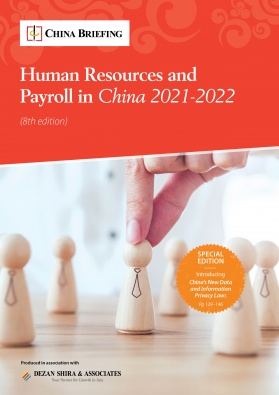More Regulatory Clarity After China Bans For-Profit Tutoring in Core Education
- China has banned for-profit tutoring in core education to rein in the country’s private education industry and improve school-life balance for families.
- Dezan Shira & Associates experts advice foreign-invested enterprises to stop if they are engaged in for-profit tutoring in core education and change their registered scope of business accordingly.
- Foreign-invested enterprises outside of the for-profit tutoring in core education should monitor for further regulatory clarity.
- On September 18, 2021, China’s Ministry of Education clarified registration guidelines for online education platforms, providing a legal way forward for the sector to develop.
China has banned for-profit tutoring in core education, following the release of strict new regulations on the lucrative sector.
On July 24, 2021, the General Office of the Communist Party of China Central Committee and the General Office of the State Council jointly released the Guidelines for Further Easing the Burden of Excessive Homework and Off-campus Tutoring for Students at the Stage of Compulsory Education.
The document was leaked and circulated a day earlier, on July 23, causing panic in the US$120 billion industry and sent shares of education companies crashing.
The guidelines include 30 measures on education sector reforms designed to improve education quality, ease homework burdens for students, and restrict private investment – both domestic and foreign – in the industry.
Later, on September 18, 2021, the Ministry of Education (MoE) released a notice clarifying the registration process for online education platforms. This notice is one of the first sets of regulations since the release of the guidelines that sheds light on how the government intends to regulate this section of the industry and offers a path forward for institutions that were impacted by the crackdown.
The new reforms overhaul the structure of China’s for-profit tutoring industry, where substantial consumer demand remains. To continue to operate, tutoring centers in China will need to quickly adapt to the new regulatory standards.
What are the changes?
According to the guidelines, the reforms aim to promote the healthy development of students, improve education quality, alleviate financial burdens on parents, and institute law-based governance of the education sector. They concentrate on education in core subjects, or compulsory education, which refers to grades K-9, covering the ages of approximately 6-15 years.
Highlights of the guidelines are as below.
Regulating off-campus for-profit tutoring and training centers
The guidelines contain measures regarding the regulation of off-campus tutoring and training centers.
New rules for regional authorization
According to the guidelines, regional governments are no longer permitted to approve new off-campus tutoring centers providing core/compulsory education. Existing ones must become registered as non-profit institutions.
Local governments must distinguish between training centers in sports, culture and art, and science and technology, and consult relevant departments to set standards for each category. Additionally, the guidelines prohibit tutoring on weekends, public holidays, and winter and summer vacations, which are popular times for off-campus education.
Impact on foreign stakeholders
Tutoring centers in core education cannot go public or be listed for financing. The guidelines call for the “excessive” capital in training centers to be controlled, and to ensure that financing is primarily used for operational costs.
The guidelines specifically ban foreign investment in such firms via mergers and acquisitions, franchise development, and variable interest entities (VIEs), which are investment vehicles frequently used by foreign investors to bypass restrictions in China’s education sector.
The hiring of foreign teachers and other staff must be according to relevant regulations, and firms cannot hire staff based outside of the country to carry out tutoring activities.
Impact on online education businesses
The guidelines further instruct regional governments to scrutinize existing online tutoring centers and re-approve them according to the new measures. Online lessons should be no more than 30 minutes, with intervals between lessons of at least 10 minutes, and should end by 9 pm. If they do not meet the updated standards, their registration and Internet Information Service Business License will be revoked.
About two months after the release of the initial document, the MoE released a notice detailing how online education platforms can register to continue operations.
The notice states that all current online education platforms must suspend all new enrollments and payments until they have obtained the requisite permits and licenses. The registration assessment and approval process of online training institutions must be completed and a supervision and management system established by the end of 2021.
Online education platforms must register either as a non-profit or for-profit legal entity upon obtaining a school license. Those offering classes in core education must register as non-profits.
To be eligible to register, institutions must meet a number of logistical requirements, including having a physical office and training center at the registered address and either building or leasing a server that is based in China.
There are also qualification requirements for both domestic and foreign staff, and the main person in charge of the institution must be a Chinese national living in China. Institutions must comply with China’s cybersecurity and data security laws and must create mechanisms for personal information protection and, in some cases, undergo personal information impact assessments.
Institutions teaching classes within the scope of core education are also not permitted to use any international courses or foreign textbooks. The taught materials must also be suitable for the grade level of the student and must not be harder than that of the national curriculum. The notice also explicitly prohibits the publishing, printing, reproduction, or distribution of illegal publications, copyright infringement, and piracy.
The educational content must adhere to the party’s educational policies. This means the educational content must ensure the separation of religion and must not contain obscenities, references to violence, terror, and gambling, and use any online games that are unrelated to education.
The notice also stipulates several management regulations that institutions must adhere to, including:
- Formulating articles of association, which clarify the institution’s training objectives, the scope of business, decision-making mechanisms, funding management, guarantee conditions, and service commitments.
- Clarifying the management procedures for the collection and refund of tuition fees.
- Standardizing contract formats and ensuring the stipulations are fair to all parties involved and don’t infringe upon consumer rights or shirk the institution’s obligations toward the consumer. The draft standard contract must be submitted when setting up the institution.
- Standardizing marketing and promotion and ensuring promotional materials don’t violate the guidelines on easing the burdens of homework and off-campus tutoring on students.
Online institutions that pass the initial approval will be granted a school license from the relevant education administration departments, after which they can register as a legal entity. Institutions that fail the initial assessment and approval process will be given the opportunity to rectify errors or missing information and apply for re-approval within a given time frame.
Although many existing companies will have to re-register as non-profits, the new notice does provide a much-needed path forward for companies to continue operating. It also provides a clearer legal framework and scope of business that new institutions can work within.
Content management
In terms of content, the guidelines call for greater supervision and management of tutoring centers and to promulgate teaching materials, while banning the use of foreign teaching materials.
Reducing the homework and study burden on students
The guidelines contain numerous measures on reducing students’ homework burdens.
Regulating homework
They instruct schools to set up management structures to coordinate homework assignments, ensure the difficulty conforms to national standards, and create evidence-based homework strategies according to age and learning goals.
Further, schools should not assign any homework to students in grades one and two, aim for an average maximum of 60 minutes of homework for grades 3-6, and an average maximum of 90 minutes for junior high school students.
Promoting physical and mental health
The guidelines also encourage schools and parents to ensure students use their spare time responsibly. They recommend students complete homework they were unable to finish at school, get physical activity, read, moderate their use of electronics, and go to bed on time.
They further encourage parents to communicate with their children and pay attention to their mental health, while boarding schools should take responsibility for students’ after-school spare time.
Improving after-school services
The guidelines put forward measures about improving schools’ after-school services.
Schools should guarantee after-school services, encourage students to voluntarily participate in them, and create plans to improve their quality. After-school services should be run by teachers, retired teachers, social workers, or volunteers.
The guidelines also instruct schools to offer and improve free online learning services. Local education departments should develop free-to-use online learning platforms and encourage students to use them.
Other notable measures
The guidelines contain various other measures, such as directives to improve and standardize the quality of education across regions, develop better evaluation techniques, and increase the quality of teaching.
Besides re-evaluating existing tutoring centers, the guidelines also call for decreasing them over time, particularly those with low operational standards. While they concentrate on ages 6-15, the guidelines state that governments should coordinate the management of students ages 3-6 and high school students.
On this note, tutoring centers cannot hold offline or online training for preschool students, including foreign language education. Governments are no longer able to approve new licenses for subject-based education for preschool students.
The guidelines also heavily restrict tutoring centers from advertising, including banning media, new media, public spaces, and billboards from displaying advertisements. Further, advertisements cannot be “hidden” in the form of textbooks, stationery, uniforms, etc.
Off-campus tutoring centers should also strengthen their party-building work and welcome the participation of party committees. Finally, the guidelines call for greater inspection and supervision of schools and education departments required to implement these policies.
Why has China introduced these reforms?
The guidelines mark the latest – and most stringent – Chinese effort to rein in the country’s private education industry, reassert the role of government-run schooling, and improve school-life balance for families.
The move aims, in part, to alleviate costs for families, thereby encouraging them to have more children, as well as to reduce stress on students. It comes after the government released census results in May showing that the country is ageing even more rapidly than previously thought.
China’s education system is exceptionally competitive, a problem exacerbated by the previous one- and two-child policies, which put undue pressure on children to support their families. According to the Chinese Society of Education, over 75 percent of students aged 6-18 years attended after-school tutoring in 2016, the most recent year of available data. This percentage is said to have risen in recent years.
The new reforms come on the heels of a new education law released in March, which limits the private sector’s role in core education and bans the use of foreign education materials.
How can education companies adapt?
China’s tutoring industry has grown rapidly for years and was on pace to continue to expand prior to the release of the new reforms. Consultancy firm Macquarie Research projected the industry to reach RMB 1.17 trillion (US$183 billion) by 2023, but the new restrictions jeopardize its prospects.
As a politically sensitive area, education in China has long been a lucrative but precarious industry for foreign participants. While the new regulations could devastate many private tutoring firms, foreign-run education firms were already prohibited from teaching core education.
Many foreign companies, however, operated through VIE vehicles, and will now need to quickly adapt to new structures. Further, companies accustomed to hiring foreign teachers who do not meet professional visa requirements will need to recruit more professional talent that meets formal standards.
Abby Chen, Senior Associate at Dezan Shira & Associates, advises, “Foreign-invested enterprises in core education have no choice but to stop engaging in such activities in accordance with the guidelines, and to change their registered business scope with the company registry.”
Despite the new restrictions, foreign-run education firms still have opportunities in areas like vocational education – a sector explicitly encouraged for foreign investment – as well as language training and university partnerships.
Not long after the guidelines were issued, the government placed further restrictions on video and computer game use for minors, limiting minors to just three hours of gaming per week. ByteDance, the operator of the popular short video app Douyin, has also begun restricting the amount of time users under the age of 14 can spend on the app to under 40 minutes per day in response to government pressure on internet platforms to reduce the amount of time children spend online.
It is therefore clear that both the government and parents are concerned with both undue pressures placed on children and overindulgence in entertainment. With caps placed on after-school tutoring, homework, and entertainment, recreational activities that are also educational in nature and beneficial to a child’s development may be the answer to filling free time in the evenings and on weekends.
Therefore, as training centers that teach subjects outside of the core education curriculum are still permitted to turn a profit – provided they comply with the guidelines and other regulations for running off-campus schools – companies can consider re-registering as a for-profit entity by pivoting to teaching non-core topics, such as IT, arts and drama, sports, music, and so on.
As new rules are released and boundaries are set, spaces for development are likely to become increasingly niche and compartmentalized, making it difficult for the kinds of tutoring giants that have previously dominated the sector to grow. On the flip side, this offers intriguing new opportunities for smaller, innovative companies that offer specialized educational products.
The exact rules that will be imposed on training centers in non-core education remain to be seen, and it is likely new regulations clarifying the permitted scopes of business will be released in the coming months.
Chen recommends that foreign-invested enterprises outside of core education should wait for further implementation regulations and then take action accordingly.
(This article was originally posted on July 30, 2021, and updated on September 27, 2021.)
About Us
China Briefing is written and produced by Dezan Shira & Associates. The practice assists foreign investors into China and has done so since 1992 through offices in Beijing, Tianjin, Dalian, Qingdao, Shanghai, Hangzhou, Ningbo, Suzhou, Guangzhou, Dongguan, Zhongshan, Shenzhen, and Hong Kong. Please contact the firm for assistance in China at china@dezshira.com.
Dezan Shira & Associates has offices in Vietnam, Indonesia, Singapore, United States, Germany, Italy, India, and Russia, in addition to our trade research facilities along the Belt & Road Initiative. We also have partner firms assisting foreign investors in The Philippines, Malaysia, Thailand, Bangladesh.
- Previous Article China’s Stock Markets – An Introductory Guide for Foreign Investors
- Next Article EU’s New Strategy on China: Implications for Businesses







